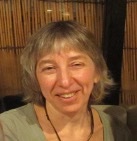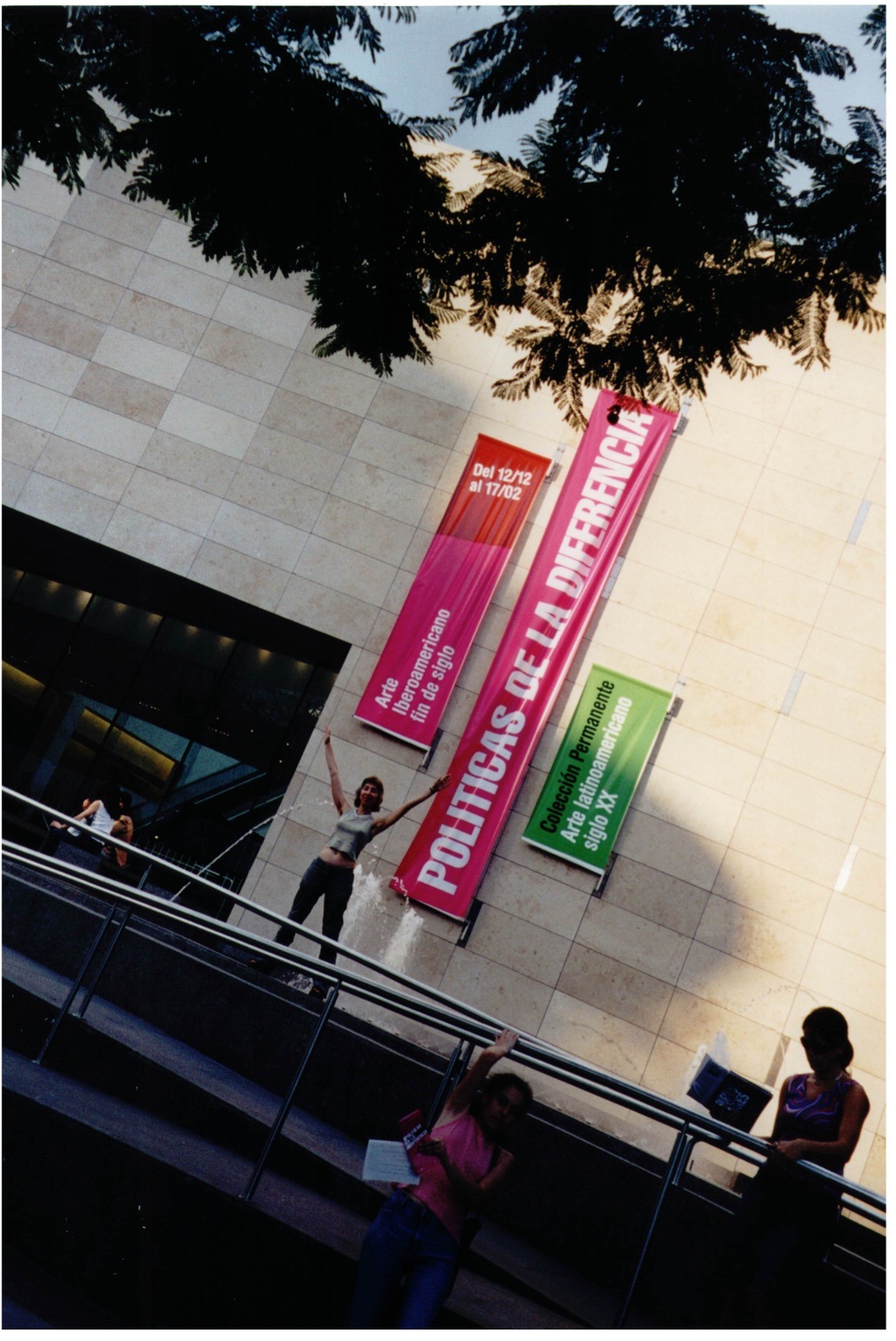Profile

Erica Burman
Birth:
1960
Training Location(s):
PhD, University of Manchester (1990)
BSc, University of Sussex (1981)
Primary Affiliation(s):
University of Manchester (2013–Present)
Manchester Metropolitan University (1986–2013)
Psychology’s Feminist Voices Oral History Interview:
Career Focus:
Developmental psychology; critical feminist psychology; minoritisation; colonialism; discourse analysis; psychoanalysis; childhood and educational studies
Biography
In Liverpool, Erica Burman was born into a family of Jewish first- and second-generation immigrants. After her father died at a young age, Burman was raised by her mother and grandmother, alongside an Irish Catholic woman who had supported her grandmother’s family and who they now invited to return and be employed to help her mother with the children. Burman describes this female network of care as vital to her development, and is keen that her nonbiological caregiver’s work does not remain invisible and unacknowledged. Burman’s Jewish heritage was also central to her young identity, and it was while attending Jewish kindergarten that she first encountered gender differences. Upon being denied the chance to wear a kippah, a screaming Burman had to be collected from school, and never returned. Later, her Jewish identity was crystallised when told by her mother that she was an “ambassador for her people” at her non-Jewish school, a label that continues to inform Burman’s antiracist, feminist identification today.
As someone identified as Jewish, Burman recognised community pressure to be a “good immigrant citizen” which worked to curtail her exposure to radical and socialist ideas even though she discovered that her father – like others from that community - had been a member of the Communist Party in his youth. As such, Burman had minimal exposure to radical feminist or socialist ideas in her youth, except through engaging with these as a Jewish woman. She joined a socialist zionist youth group at the age of 9, which introduced her to some leftwing ideas (even if she later parted ways with the zionism) and in her later teens joined the Jewish Socialist Group which had a branch in Liverpool. A key feature informing her emergent feminist identity was of her mother’s acute sense of marginalisation and sometimes discrimination by virtue of being a single mother When she studied for an undergraduate degree in developmental psychology and cognitive studies at Sussex University. Here, Burman joined various Jewish groups, including helping to form a Jewish feminist group, so embarking on her feminist identification through antiracist and (what would now be seen as) intersectional perspectives. She also engaged in critical conversations around philosophy, epistemology, and (via her psychology degree) encountered the contested status of ‘sex differences.’ More alarmingly, Burman’s later undergraduate years featured persistent sexual harassment by a fellow student, necessitating police involvement. This constellation of experiences informed Burman’s political awakening.
In 1981, Burman received Social Science Research Council (SSRC) funding for a linked award PhD at the University of Manchester. During this time, she attended sexualities classes run by feminist developmental psycholinguist Elena Lieven, which was “tremendously valuable” personally and professionally. By 1986, Burman was teaching courses including developmental psychology, social work, and nursing at Manchester Polytechnic (now Manchester Metropolitan University). Teaching exposed her to sexist comments and unfair institutional power dynamics, but also informed her doctorate, prompting her to explore politically engaged discursive and post-structuralist ideas. Burman completed her PhD in 1990 under the supervision of psychology lecturer, later psychoanalyst, John Churcher, submitting a thesis titled “Time, Language and Power in Modern Developmental Psychology.” Both teaching and studying informed Burman’s subsequently most-cited work, Deconstructing Developmental Psychology (1994), which employs feminist critique to show how dominant developmental theories perpetuate marginalisation, minoritisation, and pathologisation of mothers.
As a funded doctoral student, Burman was required to attend SSRC conferences, and it was here that important relationships blossomed. These included relationships with Ian Parker and Corinne Squire, but also Jan Burns, alongside whom Burman formed the Alliance of Women in Psychology (AWP). Against the backdrop of radical psychology movements, AWP was a space for practitioner psychologists and academics to collaborate to change psychology from within. Eventually, it was decided that institutional recognition was worth the risk of deradicalisation, and so AWP grew into the British Psychological Society’s Psychology of Women and Equalities Section (POWES). Burman is a central figure in POWES history: her keynote speech unintentionally triggered vicious debate, leading members to commit to making POWES an inclusive, supportive space. Furthermore, from 2009-2011, Burman chaired POWES. Here, she focussed on maintaining cross-disciplinary links to and tackle exclusionary elitism and create “arenas where both providers and users of services, especially feminist ones, talk to each other”.
Towards the end of her PhD, Burman was awarded a two-year lecturing position at Manchester Polytechnic. Having collected swathes of material while conducting interviews in schools, she needed to decide how best to analyze them. Burman explored debates around semantics and pragmatics among mid-20th century linguists, and eventually settled on approaches that would become discourse analysis. This critical qualitative approach spoke to Burman as a means to question the dominant social order, and resisted the canonising of quantitative methods in psychology, qualities which felt distinctly feminist. Alongside Ian Parker, Burman founded Manchester Polytechnic’s Discourse Unit in 1990, creating a space to support undergraduate students in doing qualitative work. Since then, the Unit has spawned an international network, and discourse analysis has informed some of Burman’s most popular works, including a chapter in Peter Banister’s Qualitative Methods In Psychology: A Research Guide (2007).
Upon completing her PhD, Burman continued working at Manchester Polytechnic, ascending to the role of Professor of Psychology and Women’s Studies and collaboratively developing a Psychology of Women module on the Psychology undergraduate degree (graduating from what had been termed a ‘psychology of sex differences’ module), as well as helping develop a MA in Women’s Studies on which she taught core epistemology and theory modules as well as on Women and Mental Health, Feminist Group Dynamics and Psychological Theory and Feminist Practice. The naming of her first Professorial position held significance for Burman: in the 1990s, ‘gender’ and ‘sexuality’ studies were emerging as preferable, so ‘women’ felt like a “significant feminist claim on the specificity of gender positions and relations”.
In 2013, Burman took a position at Manchester University, where she remains today as a Professor of Education in the Institute of Education. This title captures Burman’s lack of identification with the label ‘psychologist’, instead describing herself as “more of an anti-psychologist”. Presently, Burman’s desk features a diverse stack of journals, reflecting her varied research themes and interests which span critical developmental psychology through the lens of Fanonian postcolonial theory, the intersections between different forms of oppression, politically engaged methodology, and domestic violence and minoritisation. Much of her current work centres on something Burman calls ‘child as method’, an approach which considers “how the construct of childhood organises and mobilises, reflects and actively contributes to a range of interpersonal and geopolitical relations and dynamics”. “Child as method” has pushed Burman academically, and produced rigorous, expansive work, including Fanon, Education, and Action: Child As Method (2018).
Burman is also trained as a Group Analyst and teaches on the professional doctorate in counselling psychology at Manchester University, as well as contributing to various psychotherapy trainings. As such, her daily work involves supporting mental health-related practice and collaborating with the next generation of researchers and practitioners, including as a doctoral supervisor. Throughout everything, Burman remains powerfully feminist, and encourages young feminist academics hold tight to their identities, suggesting “don’t stop being feminist when you become a psychologist”.
By Siobhan Collman
To cite this article, see Credits
Selected Works
Burman, E. (2020). Developments: Child, image, nation (2nd ed.). Routledge.
Burman, E. (2018). Fanon, education, action: Child as method (1st ed.). Routledge.
Burman, E. (2008). Deconstructing developmental psychology (2nd ed.). Routledge.
Burman, E., Smailes, S. L., & Chantler, K. (2004). ‘Culture’ as a barrier to service provision and delivery: Domestic violence services for minoritized women. Critical Social Policy, 24(3), 332–357.
Banister, P. (1994). Qualitative methods in psychology : a research guide. Open University Press.
Burman, E. (1994), Innocents abroad: Western fantasies of childhood and the iconography of emergencies. Disasters, 18, 238–253.
Burman, E., & Parker, I. (1993). Discourse analytic research: repertoires and readings of texts in action. Routledge.
Parker, I., & Burman, E. (1993). Against discursive imperialism, empiricism, and constructionism: Thirty-two problems with discourse analysis. Discourse analytic research: Repertoires and readings of texts in action, 155–172.
Photo Gallery



Erica Burman
Birth:
1960
Training Location(s):
PhD, University of Manchester (1990)
BSc, University of Sussex (1981)
Primary Affiliation(s):
University of Manchester (2013–Present)
Manchester Metropolitan University (1986–2013)
Psychology’s Feminist Voices Oral History Interview:
Career Focus:
Developmental psychology; critical feminist psychology; minoritisation; colonialism; discourse analysis; psychoanalysis; childhood and educational studies
Biography
In Liverpool, Erica Burman was born into a family of Jewish first- and second-generation immigrants. After her father died at a young age, Burman was raised by her mother and grandmother, alongside an Irish Catholic woman who had supported her grandmother’s family and who they now invited to return and be employed to help her mother with the children. Burman describes this female network of care as vital to her development, and is keen that her nonbiological caregiver’s work does not remain invisible and unacknowledged. Burman’s Jewish heritage was also central to her young identity, and it was while attending Jewish kindergarten that she first encountered gender differences. Upon being denied the chance to wear a kippah, a screaming Burman had to be collected from school, and never returned. Later, her Jewish identity was crystallised when told by her mother that she was an “ambassador for her people” at her non-Jewish school, a label that continues to inform Burman’s antiracist, feminist identification today.
As someone identified as Jewish, Burman recognised community pressure to be a “good immigrant citizen” which worked to curtail her exposure to radical and socialist ideas even though she discovered that her father – like others from that community - had been a member of the Communist Party in his youth. As such, Burman had minimal exposure to radical feminist or socialist ideas in her youth, except through engaging with these as a Jewish woman. She joined a socialist zionist youth group at the age of 9, which introduced her to some leftwing ideas (even if she later parted ways with the zionism) and in her later teens joined the Jewish Socialist Group which had a branch in Liverpool. A key feature informing her emergent feminist identity was of her mother’s acute sense of marginalisation and sometimes discrimination by virtue of being a single mother When she studied for an undergraduate degree in developmental psychology and cognitive studies at Sussex University. Here, Burman joined various Jewish groups, including helping to form a Jewish feminist group, so embarking on her feminist identification through antiracist and (what would now be seen as) intersectional perspectives. She also engaged in critical conversations around philosophy, epistemology, and (via her psychology degree) encountered the contested status of ‘sex differences.’ More alarmingly, Burman’s later undergraduate years featured persistent sexual harassment by a fellow student, necessitating police involvement. This constellation of experiences informed Burman’s political awakening.
In 1981, Burman received Social Science Research Council (SSRC) funding for a linked award PhD at the University of Manchester. During this time, she attended sexualities classes run by feminist developmental psycholinguist Elena Lieven, which was “tremendously valuable” personally and professionally. By 1986, Burman was teaching courses including developmental psychology, social work, and nursing at Manchester Polytechnic (now Manchester Metropolitan University). Teaching exposed her to sexist comments and unfair institutional power dynamics, but also informed her doctorate, prompting her to explore politically engaged discursive and post-structuralist ideas. Burman completed her PhD in 1990 under the supervision of psychology lecturer, later psychoanalyst, John Churcher, submitting a thesis titled “Time, Language and Power in Modern Developmental Psychology.” Both teaching and studying informed Burman’s subsequently most-cited work, Deconstructing Developmental Psychology (1994), which employs feminist critique to show how dominant developmental theories perpetuate marginalisation, minoritisation, and pathologisation of mothers.
As a funded doctoral student, Burman was required to attend SSRC conferences, and it was here that important relationships blossomed. These included relationships with Ian Parker and Corinne Squire, but also Jan Burns, alongside whom Burman formed the Alliance of Women in Psychology (AWP). Against the backdrop of radical psychology movements, AWP was a space for practitioner psychologists and academics to collaborate to change psychology from within. Eventually, it was decided that institutional recognition was worth the risk of deradicalisation, and so AWP grew into the British Psychological Society’s Psychology of Women and Equalities Section (POWES). Burman is a central figure in POWES history: her keynote speech unintentionally triggered vicious debate, leading members to commit to making POWES an inclusive, supportive space. Furthermore, from 2009-2011, Burman chaired POWES. Here, she focussed on maintaining cross-disciplinary links to and tackle exclusionary elitism and create “arenas where both providers and users of services, especially feminist ones, talk to each other”.
Towards the end of her PhD, Burman was awarded a two-year lecturing position at Manchester Polytechnic. Having collected swathes of material while conducting interviews in schools, she needed to decide how best to analyze them. Burman explored debates around semantics and pragmatics among mid-20th century linguists, and eventually settled on approaches that would become discourse analysis. This critical qualitative approach spoke to Burman as a means to question the dominant social order, and resisted the canonising of quantitative methods in psychology, qualities which felt distinctly feminist. Alongside Ian Parker, Burman founded Manchester Polytechnic’s Discourse Unit in 1990, creating a space to support undergraduate students in doing qualitative work. Since then, the Unit has spawned an international network, and discourse analysis has informed some of Burman’s most popular works, including a chapter in Peter Banister’s Qualitative Methods In Psychology: A Research Guide (2007).
Upon completing her PhD, Burman continued working at Manchester Polytechnic, ascending to the role of Professor of Psychology and Women’s Studies and collaboratively developing a Psychology of Women module on the Psychology undergraduate degree (graduating from what had been termed a ‘psychology of sex differences’ module), as well as helping develop a MA in Women’s Studies on which she taught core epistemology and theory modules as well as on Women and Mental Health, Feminist Group Dynamics and Psychological Theory and Feminist Practice. The naming of her first Professorial position held significance for Burman: in the 1990s, ‘gender’ and ‘sexuality’ studies were emerging as preferable, so ‘women’ felt like a “significant feminist claim on the specificity of gender positions and relations”.
In 2013, Burman took a position at Manchester University, where she remains today as a Professor of Education in the Institute of Education. This title captures Burman’s lack of identification with the label ‘psychologist’, instead describing herself as “more of an anti-psychologist”. Presently, Burman’s desk features a diverse stack of journals, reflecting her varied research themes and interests which span critical developmental psychology through the lens of Fanonian postcolonial theory, the intersections between different forms of oppression, politically engaged methodology, and domestic violence and minoritisation. Much of her current work centres on something Burman calls ‘child as method’, an approach which considers “how the construct of childhood organises and mobilises, reflects and actively contributes to a range of interpersonal and geopolitical relations and dynamics”. “Child as method” has pushed Burman academically, and produced rigorous, expansive work, including Fanon, Education, and Action: Child As Method (2018).
Burman is also trained as a Group Analyst and teaches on the professional doctorate in counselling psychology at Manchester University, as well as contributing to various psychotherapy trainings. As such, her daily work involves supporting mental health-related practice and collaborating with the next generation of researchers and practitioners, including as a doctoral supervisor. Throughout everything, Burman remains powerfully feminist, and encourages young feminist academics hold tight to their identities, suggesting “don’t stop being feminist when you become a psychologist”.
By Siobhan Collman
To cite this article, see Credits
Selected Works
Burman, E. (2020). Developments: Child, image, nation (2nd ed.). Routledge.
Burman, E. (2018). Fanon, education, action: Child as method (1st ed.). Routledge.
Burman, E. (2008). Deconstructing developmental psychology (2nd ed.). Routledge.
Burman, E., Smailes, S. L., & Chantler, K. (2004). ‘Culture’ as a barrier to service provision and delivery: Domestic violence services for minoritized women. Critical Social Policy, 24(3), 332–357.
Banister, P. (1994). Qualitative methods in psychology : a research guide. Open University Press.
Burman, E. (1994), Innocents abroad: Western fantasies of childhood and the iconography of emergencies. Disasters, 18, 238–253.
Burman, E., & Parker, I. (1993). Discourse analytic research: repertoires and readings of texts in action. Routledge.
Parker, I., & Burman, E. (1993). Against discursive imperialism, empiricism, and constructionism: Thirty-two problems with discourse analysis. Discourse analytic research: Repertoires and readings of texts in action, 155–172.


